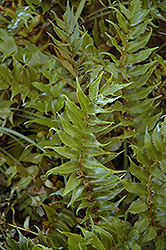Height: 24 inches
Spacing: 12 inches
Sunlight:
![]()
![]()
Hardiness Zone: 3
Other Names: syn. Phegopteris decursive-pinnata
Description:
A low to medium fern that forms slow-spreading clumps of upright, arching fronds creating tidy mounds; great for moist, shady borders; tolerates sun with adequate moisture; divide in spring
Ornamental Features
Beech Fern's attractive ferny pinnately compound leaves remain green in colour throughout the season on a plant with an arching habit of growth.
Landscape Attributes
Beech Fern is an herbaceous perennial with a shapely form and gracefully arching foliage. Its medium texture blends into the garden, but can always be balanced by a couple of finer or coarser plants for an effective composition.
This is a relatively low maintenance plant, and should not require much pruning, except when necessary, such as to remove dieback. Deer don't particularly care for this plant and will usually leave it alone in favor of tastier treats. It has no significant negative characteristics.
Beech Fern is recommended for the following landscape applications;
- Mass Planting
- Rock/Alpine Gardens
- General Garden Use
- Container Planting
- Hanging Baskets
Planting & Growing
Beech Fern will grow to be about 24 inches tall at maturity, with a spread of 18 inches. When grown in masses or used as a bedding plant, individual plants should be spaced approximately 12 inches apart. Its foliage tends to remain dense right to the ground, not requiring facer plants in front. It grows at a fast rate, and under ideal conditions can be expected to live for approximately 5 years. As an herbaceous perennial, this plant will usually die back to the crown each winter, and will regrow from the base each spring. Be careful not to disturb the crown in late winter when it may not be readily seen!
This plant does best in partial shade to shade. It prefers to grow in average to moist conditions, and shouldn't be allowed to dry out. It is not particular as to soil type or pH. It is somewhat tolerant of urban pollution. This species is not originally from North America. It can be propagated by division.
Beech Fern is a fine choice for the garden, but it is also a good selection for planting in outdoor containers and hanging baskets. It can be used either as 'filler' or as a 'thriller' in the 'spiller-thriller-filler' container combination, depending on the height and form of the other plants used in the container planting. It is even sizeable enough that it can be grown alone in a suitable container. Note that when growing plants in outdoor containers and baskets, they may require more frequent waterings than they would in the yard or garden. Be aware that in our climate, most plants cannot be expected to survive the winter if left in containers outdoors, and this plant is no exception. Contact our experts for more information on how to protect it over the winter months.
